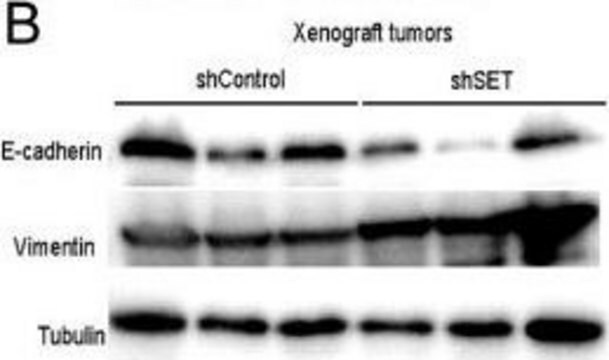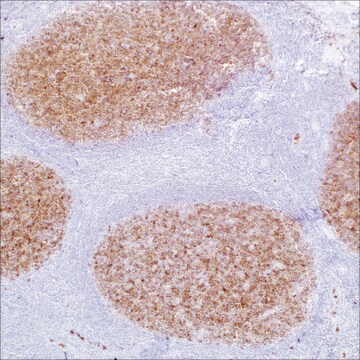347M-1
Vimentin (V9) Mouse Monoclonal Antibody
About This Item
Productos recomendados
biological source
mouse
Quality Level
100
500
conjugate
unconjugated
antibody form
ascites fluid
antibody product type
primary antibodies
clone
V9, monoclonal
description
For In Vitro Diagnostic Use in Select Regions (See Chart)
form
buffered aqueous solution
species reactivity
human
packaging
vial of 0.1 mL concentrate (347M-14)
vial of 0.5 mL concentrate (347M-15)
bottle of 1.0 mL predilute (347M-17)
vial of 1.0 mL concentrate (347M-16)
bottle of 7.0 mL predilute (347M-18)
manufacturer/tradename
Cell Marque™
technique(s)
immunohistochemistry (formalin-fixed, paraffin-embedded sections): 1:100-1:500
isotype
IgGκ
control
tonsil
shipped in
wet ice
storage temp.
2-8°C
visualization
cytoplasmic
Gene Information
human ... VIM(7431)
General description
Quality
 IVD |  IVD |  IVD |  RUO |
Linkage
Physical form
Preparation Note
Other Notes
Legal Information
¿No encuentra el producto adecuado?
Pruebe nuestro Herramienta de selección de productos.
Storage Class
12 - Non Combustible Liquids
wgk_germany
WGK 2
flash_point_f
Not applicable
flash_point_c
Not applicable
Elija entre una de las versiones más recientes:
Certificados de análisis (COA)
¿No ve la versión correcta?
Si necesita una versión concreta, puede buscar un certificado específico por el número de lote.
¿Ya tiene este producto?
Encuentre la documentación para los productos que ha comprado recientemente en la Biblioteca de documentos.
Los clientes también vieron
Nuestro equipo de científicos tiene experiencia en todas las áreas de investigación: Ciencias de la vida, Ciencia de los materiales, Síntesis química, Cromatografía, Analítica y muchas otras.
Póngase en contacto con el Servicio técnico









